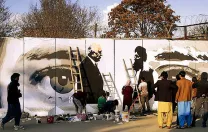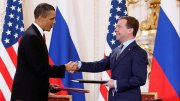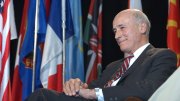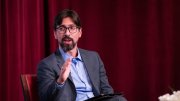Ukraine has proved to be a different kind of emergency. Unlike Afghan scholars, for whom the threat is so dire that the only choice is to evacuate as many as possible, many Ukrainians prefer, at least for now, Jane Unrue says, to remain in their own country or nearby. Some of them have joined the fighting; others have loved ones in the war. Plus, “There are pathways for refugees in Europe, where they’re receiving support,” she says. This year, Harvard’s program has invited three Ukrainians so far—a mathematician, a comparative literature scholar, and a Crimean physician—along with another mathematician from Russia.
But mainly Unrue remains focused on other strategies. With four other literary professionals (bookseller Mitchell Kaplan and writers Askold Melnyczuk, Christopher Merrill, and Carolyn Forché), she has been working on a project called Helping Ukranian Books and Booksellers, to aid the war-damaged publishing industry. And with Heal Ukraine Group (HUG), a consortium of Harvard-affiliated doctors and scientists in Boston, Unrue helped put together Medical Scholars at Risk, a joint program that allows Ukrainian clinicians to receive up to six months of specialized training at a Harvard hospital. “During war, medical education gets skewed, because specialists are doing trauma care instead of diabetes or chronic heart disease or oncology,” says Mark Poznansky, an infectious disease specialist at Mass General Brigham and Harvard Medical School professor, who co-leads the program. “You can lose [the education of] a whole generation of physicians that way.”
The urgency struck him all at once when news broke of the war. “We have to act now, not in five years’ time,” he remembers thinking. “We have to do whatever we can do.” The son and grandson of Polish Jews who escaped to Canada just before World War II, Poznansky recalls a plaque that hung on the wall at the University of Edinburgh, where he attended medical school. “It said that between 1941 and 1945, the Polish medical school existed in exile in Edinburgh,” he says. “Every day, I walked past that sign. The truth is, the Scottish people brought medical trainees out of Poland and trained them in Edinburgh to maintain medical education while their country was in ruins.” Last February, when Russia invaded Ukraine, the memory of that plaque in Edinburgh flashed into his mind. “And I suddenly realized what a medical school being in exile meant—‘in exile’ means you go back. Most of those Polish physicians went back to Poland after the war, to help rebuild their country and to help rebuild the medical school system.”
His goal for the Ukraine project, a partnership between HUG and Harvard’s Scholars at Risk Program, is fundamentally the same. “The idea is to provide learning opportunities and have people take those skills back to Ukraine,” he says. So far, seven Ukrainian clinicians—including an oncologist, a research fellow, a psychiatrist, and a rural family physician—have been offered “observerships”; the first two arrived in late 2022.
One of them is Dariia Simchuk, an anesthesiologist from Zhytomyr, a city about 90 miles west of Kiev. She describes how the war has altered her life and work there: “No electricity, sometimes no heating, lots of damaged and destroyed hospitals. Lots of doctors who went to the army; some of them died.” She came to Boston to learn about nerve blocks, anesthetic injections that target certain nerves to decrease pain in specific parts of the body. The technique can sometimes allow doctors to avoid general anesthesia, and it also speeds up post-surgical recovery and reduces the need for pain medications. “It’s often used in operations on the extremities, like the legs and the arms—including after war injuries,” says Nelya Melnitchouk, a colorectal surgeon at Brigham and Women’s and assistant professor at Harvard Medical School who is part of the HUG team’s leadership. (A Ukranian American who came to the United States at 18, Melnitchouk co-founded a nonprofit, the Global Medical Knowledge Alliance, to help improve cancer outcomes in Ukraine by providing research and educational materials through an open-access platform.)
The nerve-block training Simchuk is receiving, says Melnitchouk, will be useful during the current crisis, to help treat the wounded, but also after the war, to help orthopedic patients with more routine problems. The same is true of the training Simchuk is also receiving in resuscitation practices in Brigham and Women’s intensive care unit, and other skills from the Disaster and Emergency Medicine program at Beth Israel Deaconess Medical Center. “We have the intention of building into each person’s curriculum some component of disaster medicine,” says Jacqueline Hart ’87, a physician and behavioral health specialist who is also part of the HUG team (Hart directs the Bassuk Center on Homeless and Vulnerable Children and Youth). “We also intend to build in trauma-informed care as an approach to patient care, regardless of the person’s specialty, because that will be needed, really, for decades to come. The trauma that will be experienced in Ukraine will be multi-generational.”
Like other fellows in the Medical Scholars at Risk program, Simchuk is also involved in educating other physicians. “Working as a doctor is only part of my real work,” she says. Five years ago, she and a friend from medical school founded an educational platform called Progress, which translates research papers and medical guidelines into Ukrainian; the information is meant to help medical students, interns, and practicing doctors. The organization also hosts conferences, seminars, and broadcasts for healthcare providers. Simchuk says her time in Boston has sparked some ideas for online courses involving American doctors. “The intent is that our fellows go back and teach other physicians and providers in Ukraine,” Melnitchouk says. “Our program is open not just to physicians—we’re open to nurses or respiratory therapists or any other specialties that are needed—but we are focusing on younger or mid-career clinicians who speak English and who can bring skills back to their colleagues.”
Recently, the program’s leaders assembled a scientific advisory board, chaired by Poznansky and Melnitchouk and composed of several senior Ukrainian physicians (including a representative from the country’s ministry of health). The advisory board’s purpose is to help guide the program’s objectives, choose future fellows, and scale up its size. “A large reason we wanted to put this together was to hear directly on a regular basis from folks who are in Ukraine,” Hart says. “Part of the challenge with responding to needs on the ground is that we try to be nimble; we try to prioritize based on what we're being told is most necessary, as opposed to coming in and imposing what we think is needed.” Among the advisory board’s members is a Ukrainian obstetrician/gynecologist, who has been seeing “tremendously elevated rates of preterm labor and other complications related to pregnancy,” Hart says. “Most of the women he’s treating right now, they’re scared stiff; there’s huge degrees of fear and uncertainty. And so we’ve been wanting to bring an OB/GYN here for one of these observerships,” to learn perinatal techniques from obstetricians as well as psychiatrists who specialize in women's health. Those techniques, she adds, will be applicable both now and in the future.
Simchuk, who plans to spend January absorbing lessons in the intensive care unit, will soon get the chance to use—and to teach—the skills she’s been learning, when she returns home sometime in February. “This can really change something in Ukrainian medicine.”









